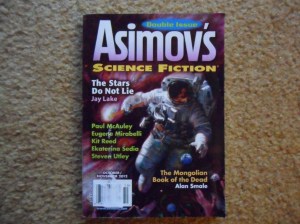This closes out my series on reviewing the Hugo Nominated Novellas. For those of you just joining us, here are the other nominees, with links to my reviews:
On a Red Station, Drifting by Aliette de Bodard
After the Fall, Before the Fall, During the Fall by Nancy Kress
The Emperor’s Soul by Brandon Sanderson
The Last Stand of the California Browncoats by Mira Grant

On an alternate earth on the brink of technological change, the holy books have always told people that six thousand years ago The Increate touched the Earth in eight places, and in those places mankind flourished. But photography, larger telescopes, electricity, and the telegraph, have made their appearance. In a society very uncomfortable with chance, a society where history and religion are pretty much the same thing, I imagine this would be more than a little traumatic.
A might happen anywhere, every so often a heresy awakes, something about humanity being older than six thousand years, or having originated elsewhere, or aliens having built the pyramids. You know, all sorts of nonsense. Nonsense which will not be tolerated by either the religious or the secular leaders of the planet. In this, the two groups work together to squash damaging heresies.
Doctor Morgan Abutti, however, has been researching the same section of the sky for years. He’s not sure what he’s found, he just knows it shouldn’t be there. He presents his paper to the the Planetary Society, abruptly shocks his older and more experienced peers out of their chairs, and as one could expect from a scientific society that is ruled by religion, he is summarily thrown out and brought before a treason judge.
Elsewhere, His Holiness Lambione XXII, the highest priest of the ruling religion is on his deathbed. He insists that Bilious Quinx, his friend and confidant, promise him a few things on their last night together. Shortly after Lamboine’s death, a message comes from a leader within the Planetary Society that this time, a heretic may have proof. Quinx had better investigate. it beats sitting around and helping elect the next high priest, right?
The story jumps between Morgan, who expects to be imprisoned or executed at any moment, and Quinx, who leaves the quiet sanctuary of his temple district to venture out into the real world on a mission that will include pirates, liars, and choices that were never part of his job description. By the end of the story both men will find themselves standing on an event horizon of truth. A step too far into the abyss, and one gains ultimate truth yet loses the ability to tell anyone about it. Yes, I am being purposely overly vague.
Two powerful political groups, both fighting to be right, each far more interested in power and control than in the truth. Is this what Galileo felt like? Our hearts and minds may tell us one thing, but nature is incapable of lying. And that’s the kicker: if we have the choice between truth and comfort, which will we choose? When, if ever, is it acceptable to suppress knowledge that could affect an entire planet? As Lamboine says:
“Privacy is just a special case of truth, or its withholding”
Is that what all the hubbub is about? privacy??
This story feels magnificently like both the prologue and epilogue to something much larger than itself. Lake offers us a view into a complicated and nuanced world, one still feeling its way out of institutionalized racism and classism, a world I’d be interested in reading more about. He’s certainly not the first author to write about how the suppression of knowledge affects a society, and I enjoyed the way he did it, showing two sides who are actually fighting for the same thing, and both are have the “best intentions” for the populace. However The Stars Do Not Lie has a slow and incredibly laborious start, and I worry some readers may get frustrated with Lake’s writing style and give up on it before the “good stuff” shows up.
I haven’t read much Jay Lake, so I don’t know if this is his regular writing style, or if he was going for a more formal, historical document feeling. Characters have very involved names and titles, there’s just a lot of documentation given to everything. Hints at a much larger world, which is nice, but also risks burying the reader under too much detail so early in the story. The Stars Do Not Lie requires your patience, but if you give it the time it deserves, it will reward you.
Filed under: Hugo Awards, Jay Lake Tagged: Hugo Awards, religion, science fiction 






